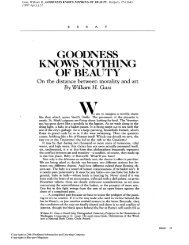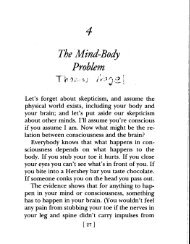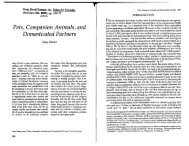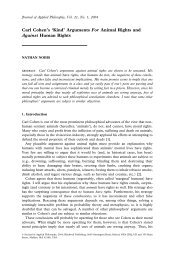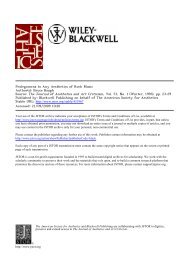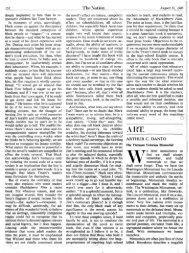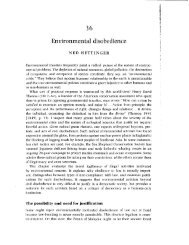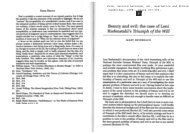Karen Hanson, "How Bad Can Good Art Be?"
Karen Hanson, "How Bad Can Good Art Be?"
Karen Hanson, "How Bad Can Good Art Be?"
- No tags were found...
You also want an ePaper? Increase the reach of your titles
YUMPU automatically turns print PDFs into web optimized ePapers that Google loves.
<strong>How</strong> bad can good art be<br />
mode of action as any other, provided, of course, that one has some<br />
writing talent aild some opportunity to have the play produced<br />
and seen, provided one isn't already employed as, say, an AIDS<br />
researcher, or the head of the NIH, or the president of the United<br />
States, or .... Remembering that both our native endowments and<br />
our acquired roles, our untapped personal talents and our undischarged<br />
social debts are among the conditions that determine the reasonableness<br />
or defensibility of a given course of action, we must<br />
assume that for each of us, at each stage of our lives, there will be better<br />
and worse bets about what course of action is likely to be most<br />
useful. If I am a middle-aged scientist with a good track record in<br />
medical research but no previous literary experience or calling, it is<br />
probably true that devoting myself to writing a play about AIDS is<br />
likely to be among the least productive things I might do (about<br />
AIDS). 12 We should thus at least qualify, relativize, the flat generality<br />
of Stoppard's claim. Remembering, though, that action is never<br />
accompanied by a guarantee of its felicitousness, we may also want<br />
to challenge more directly the assurance of Stoppard's assertion, but<br />
now with a worry about the uncertainties of moral luck.<br />
<strong>Be</strong>rnard Williams memorably sketches the problem of moral luck<br />
by drawing out the considerations relevant to the personal justification<br />
of an artist, an exemplary or schematized Gauguin. When Gauguin<br />
leaves his family destitute in order to pursue in Tahiti the development<br />
of his art, there can be nothing, at the time of his departure,<br />
that can justify his action: "Justification, if there is to be one, will be<br />
essentially retrospective. " 13 Success as an artist, the creation of world<br />
historically valuable art, is the only thing that can redeem his decision<br />
to depart, to abandon his domestic responsibilities, but success<br />
cannot be guaranteed - or even confidently predicted on reasonably<br />
adequate grounds - at the time of his departure. If the justification of<br />
important life projects - such as writing a play - sometimes depends<br />
on moral luck, on the projects' happening to turn out well, then we<br />
cannot say, as we commit ourselves to them, that these projects are<br />
definitely worthwhile or, more crucially, that they may rightfully take<br />
precedence over our standing obligations or over other tasks we might<br />
as reasonably undertake.<br />
Philosophers who accept the idea that morality and rational justification<br />
are subject to the vagaries of luck have various reactions to<br />
this disturbing thought. Either the nature or the scope of morality, or<br />
both, may seem deeply unsettled. Without proceeding further into<br />
this contested conceptual territory, we can simply note that if there<br />
211



